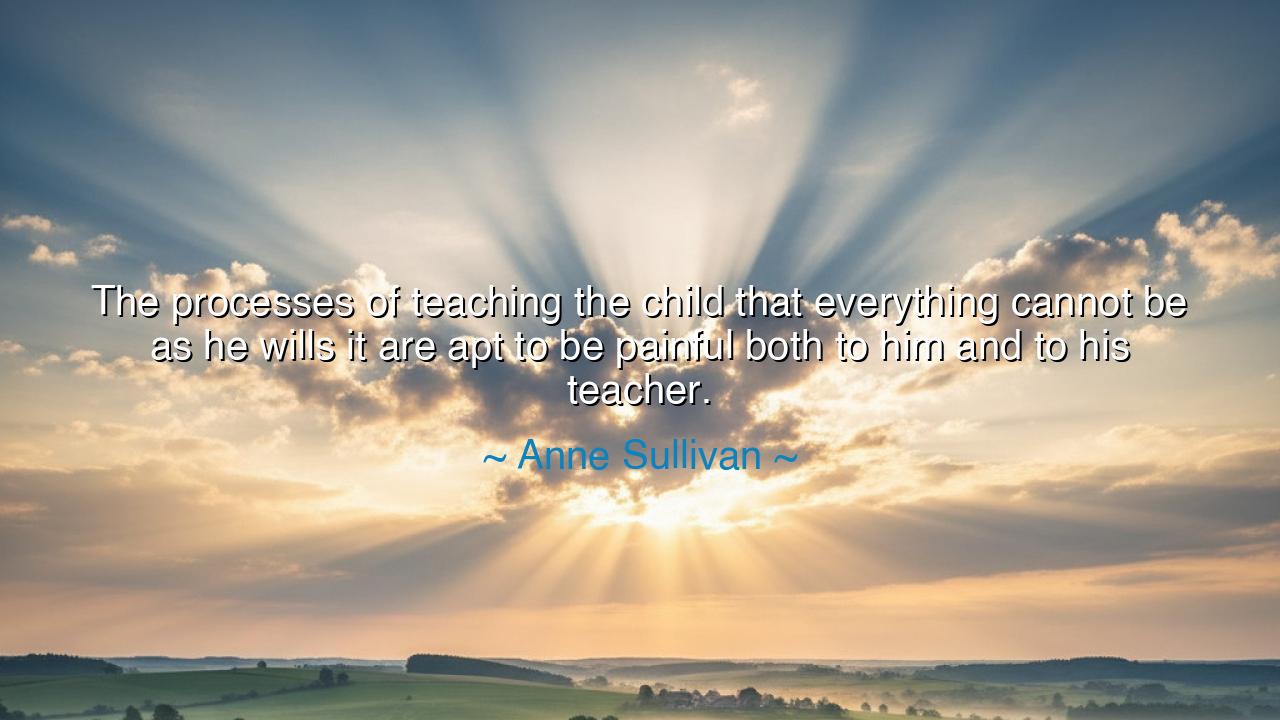
The processes of teaching the child that everything cannot be as
The processes of teaching the child that everything cannot be as he wills it are apt to be painful both to him and to his teacher.






“The processes of teaching the child that everything cannot be as he wills it are apt to be painful both to him and to his teacher.” Thus spoke Anne Sullivan, the immortal “miracle worker,” who gave to Helen Keller not only the gift of language, but the discipline of the soul. In this truth she lays bare the heart of education: that to teach is not merely to impart knowledge, but to guide a will that is raw and unshaped. The shaping of the will—teaching the child that the world does not bend entirely to his desires—is a crucible, and in this crucible both student and teacher must suffer before wisdom is born.
The meaning of this quote lies in the eternal conflict between desire and reality. Every child enters the world as a sovereign of his own will, accustomed to demanding, crying, reaching, and expecting the world to respond. Yet life does not bow to the unbridled will, and so begins the painful but necessary lesson: that one must yield, adapt, and master oneself. For the teacher, this process is no less painful, for they must be both firm and compassionate, restraining with love and guiding with patience, knowing the struggle is necessary even when it breaks the heart.
The story of Anne Sullivan and Helen Keller is the most vivid embodiment of this truth. Keller, deaf and blind from infancy, was a child of unrestrained will, prone to tantrums and wild resistance. When Sullivan entered her life, she faced not only the challenge of teaching language but of disciplining Keller’s spirit. The process was long, exhausting, and often agonizing for both. Sullivan herself admitted the pain of imposing structure upon the child, yet through persistence and patience she broke through the barriers, and Keller emerged not as a creature of unchecked will, but as a woman of remarkable strength, intellect, and compassion.
The origin of Sullivan’s words is found in her own life of hardship. Orphaned, half-blind, raised in poverty, she understood both suffering and discipline. Her teaching was born not of theory but of lived experience: she knew that life itself would never bow to one’s will, and that the earlier a child learns this, the better they will endure its storms. Thus her method was not cruelty, but mercy—for to indulge the child in illusions is to prepare them for despair, while to teach them restraint is to prepare them for triumph.
There is heroism in this painful process. To deny a child nothing is to abandon them; to teach them limits is to forge resilience. The teacher who endures the child’s tears and anger, the parent who stands firm in love while saying “no,” takes upon themselves the burden of temporary suffering in exchange for lifelong strength in the one they guide. The child resists, the teacher aches, but through the struggle both are ennobled.
The lesson for us is universal: in life, not everything will bend to our will. To rage against this truth is to waste strength; to learn it early is to gain peace and power. Parents, teachers, and mentors must therefore embrace their sacred duty—to guide with firmness, to love with patience, and to endure the discomfort of discipline for the sake of the greater good. And those who learn must accept that pain is not punishment, but preparation.
Therefore, dear listener, engrave Anne Sullivan’s wisdom upon your heart: the process of teaching limits is painful, but it is the path to freedom. If you are a teacher, be steadfast; if you are a learner, be humble. In the short struggle lies the seed of lifelong resilience. And remember always that true love is not indulgence, but the courage to guide another soul toward strength, even through the valley of struggle. For only by mastering the will does one become free to master the world.






AAdministratorAdministrator
Welcome, honored guests. Please leave a comment, we will respond soon